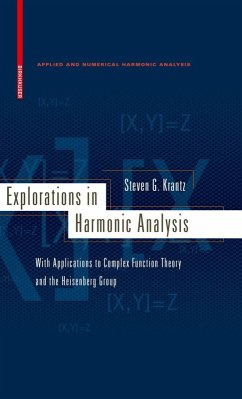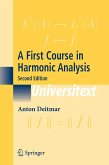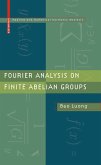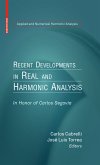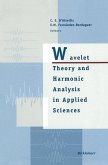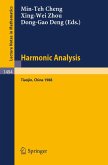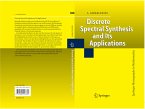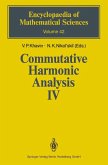Within the textbook, the new ideas on the Heisenberg group are applied to the study of estimates for both the Szegö and Poisson-Szegö integrals on the unit ball in complex space. Thus the main theme of the book is also tied into complex analysis of several variables. With a rigorous but well-paced exposition, this text provides all the necessary background in singular and fractional integrals, as well as Hardy spaces and the function theory of several complex variables, needed to understand Heisenberg analysis.
Explorations in Harmonic Analysis is ideal for graduate students in mathematics, physics, and engineering. Prerequisites include a fundamental background in real and complex analysis and some exposure to functional analysis.
Dieser Download kann aus rechtlichen Gründen nur mit Rechnungsadresse in A, B, BG, CY, CZ, D, DK, EW, E, FIN, F, GR, HR, H, IRL, I, LT, L, LR, M, NL, PL, P, R, S, SLO, SK ausgeliefert werden.
"This is an ambitious introduction to a particular direction in modern harmonic analysis. It presents harmonic analysis in vitro - in a context in which it is actually applied complex variables and partial differential equations. This will make the learning experience more meaningful for graduate students who are just beginning to forge a path of research." (Vasily A. Chernecky, Zentralblatt MATH, Vol. 1171, 2009)
"Writing a 350 page account on harmonic analysis ... is no easy task and making the presentation suitable for graduate students even less so. ... it is indeed the purpose of the book under review ... . Krantz has done an admirable job in condensing the ideas of Stein's tract into a highly readily text suitable for a wide variety of readers. ... It is done with such an enthusiasm ... that even seasoned mathematicians should be able to enjoy the book." (Troels Roussau Johansen, Mathematical Reviews, Issue 2011 a)
"The text is very well organized: each chapter begins with an introductory Prologue, each section with a Capsule giving a quick preview of the material, and each key theorem is preceded by a Prelude providing motivation and putting the result in an adequate context. ... The book will be useful for advanced courses on harmonic analysis, singular integrals, as well as reference text for researchers in various domains of analysis, both pure and applied." (Gabriela Kohr, Studia Universitatis Babes-Bolyai, Mathematica, Vol. LV (4), December, 2010)

